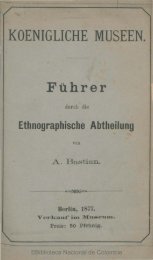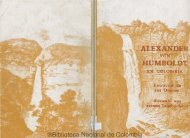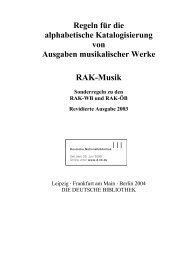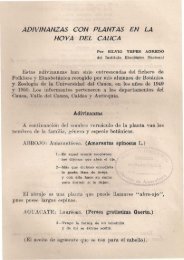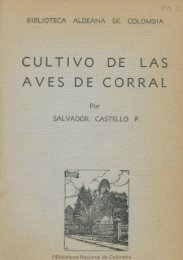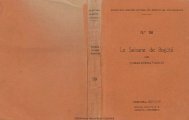Create successful ePaper yourself
Turn your PDF publications into a flip-book with our unique Google optimized e-Paper software.
<strong>©Biblioteca</strong> <strong>Nacional</strong> <strong>de</strong> <strong>Colombia</strong><br />
310 N OTES.<br />
The ancients believed tbat the stars were nourished by the vapors arising<br />
from the earth and sea, or tbat they fed upon the fiery particles in the<br />
aether itself.<br />
610. Vocant expresses that he is <strong>de</strong>pen<strong>de</strong>nt on <strong>de</strong>stiny, and so implies<br />
that he will have to leave Dido. Cf. Aen. III. 494, and V. 656.<br />
614-15. Casu, misfortune, disaster. - Ore locuta est . Such pleonasms<br />
are frequent in classical writers. cr. the phrase, " ITo opened<br />
his mouth and taught them." - Quis casus, .ol,at ill-jo)'tlllle.<br />
617. Tune, etc., so. e.. Art thou that Aeneas?<br />
619. Teucer, (son of Telamon, king of Salamis, and of IIesione, a<br />
daughter of Laomedon and sister of Priam,) being refused admission<br />
in Salamis by his father on his return from Troy, foun<strong>de</strong>d a new Salamis<br />
in Cyprus. Virgil supposes him to have sought the assistance of<br />
Belus, king of Tyre, whom he represents to have conquered the Cyprians<br />
shortly before. - 621. Genitor, (my) father.<br />
623. Cognitus, sc. eat. " A n instance of p,·otoz.llgnln J ; . e., a predicate<br />
(coy"ill/B) common to sevcral subjects (ca.uB, IIomell, rege8), but<br />
agrceing in gen<strong>de</strong>r and number with one only, and that the one nearest<br />
to it." n.<br />
624. P elasgi, i. e. Grecian. Tllose most ancient inhabitants of Greece<br />
arc often put for the nation.<br />
625. Ipse hostis. 'feucer him.elf, enemy tbough be was. HOBti ••<br />
H. 363; A. & S. 204. - Ferebat, IIBed to extol. - Teucros, the Trojans.<br />
626. Stirpe. When ab is used with ortus, "e111ote .. origin is generally<br />
<strong>de</strong>noted than when the preposition is omitted.- Vole bat, ; . e., gave himself<br />
out to be, would have it that he was. - 632. Templis = in templis.<br />
Honorem, a thanksgiving. - 635. Suum, gen . pI. of B" ••<br />
636. Mu.nera and laetitiam are in appositi"n with the accusatives<br />
in tbe two preceding lines. - Dii, an old contraction for diei, of the dny.<br />
- Mu.nera - dii, lit. as gifts and the enjoyment of the day i i. e., as<br />
gifts "nu (the menns for) the day" enjoyment. Another reading is, <strong>de</strong>;<br />
(i. e. Bacchi), "the joy of Bacchus," i. e. wine. 'fho passage is a difficult<br />
one, and it is not impossible tbat Virgil would have improved it,<br />
if he had Ii"ed to complete the line.<br />
637. Domus i nterior. II. 441,6; A. & S. 205, Rem. 17 ; B.662.<br />
639. Vestes, coverlel.. , .... pply ,".1""111'("". " I n oonnise narrution<br />
and <strong>de</strong>scription, substantives are often used "lone without verbs." W.<br />
- Ostro, abl. of the m:\[eril... II. 425, 1.<br />
640. I ngens argentum, n great (number of) silver (vessels), or<br />
limply, mn s of silver plate. - Mensis = in mellBie.<br />
645. F erat , "report," he SllyS. - F erat and duoat , subj. in oratio



